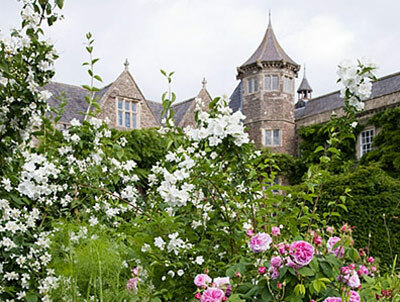This article originally appeared in the Wessex Chronicle volume 15, issue 3 (autumn 2014).
The following printed item – labelled ‘MALMS Whitsuntide 1918’ – was found pasted in the visitors’ book of Alfred Bowker of The Malms, a large house at Shawford, near Winchester.
As Mayor of Winchester, Bowker, an energetic local solicitor, was instrumental in the commissioning of King Ælfred’s statue in the Broadway. The Malms (now demolished) was a pioneering, if problematic example of the use of reinforced concrete.

All the beauty of early summer bloomed out in one week. The apple trees were covered with pink flowers and red buds. In the grass below them the narcissus gleamed. The thorns came suddenly aglow with blossom; the lilacs were each a heavy mass of colour and scent; the wistaria hung its bunches over the house-walls. Outside the garden the woods were misty with bluebells; the meadows gaily spread with buttercups and daisies, or tricked
more daintily with cowslips and cuckoo flowers. And after the long heat of the day, the nights were magical with the cool moon and the wide-set stars, and the nightingale
singing near the stream where the garden ends.
Such days and nights are all but intoxicating. So beautiful are they, and so rare, that they seem like some choice and expensive pleasure, which only the rich can afford and only the leisured enjoy. They carry an air almost of dissipation. Yet they are open to all dwellers in the country; they cost nothing, and take no time from work. They are a condition, not an achievement. We did not buy them: still less did we earn them. We rob no one else by
njoying them, retard no good work, obstruct no reform. If we have no
right to them, at least we do no wrong in accepting them as a gift. And, while we feel that it is “almost wicked” to be so happy – the old English puritanism, or some far older human fear of happiness, prompting us to mistrust the gift – the truth is that we are in such moments much nearer goodness than when the sky is grey and the wind in the east, and life seems a continuous effort instead of a blessed state.
At such rare times as these past few days have brought, the joy of being alive is forced upon us as never else. The present insists upon recognition. Each moment demands conscious enjoyment. As a rule, man looks before and after. He is hardly aware of the present, so fondly does he dream of the past, so eagerly or timorously does he peer into the future. Only now and then does the beauty and the dearness of his earthly setting compel him to concentrate his being in each moment. You cannot overlook the apple blossom, the lilac, the moonlight, the sound of the nightingale, and of the running water.
You cannot even remember that a week hence it will all be over, so intensely are you aware of it and of yourself within it. And thence, perhaps, you pass to the thought that it would be well for you to be more continuously and consciously aware of the present, not a moment of which but must have in it something consoling, or enlarging, or strengthening. For now, more than ever before, we know, vicariously or from experience, that life is short and
uncertain. In these days there is “no knowing what will happen”; and the folly of making plans for the future, however bravely, is seen at first hand to be as foolish as the great wise
men have all declared it to be. In the world before the war (though we were far from as silly and as greedy as certain timorous people have tried to make out) we were, beyond doubt,
to be found scampering more than was reasonable. We planned elaborate pleasures, worked hard to contrive them, and in the act of enjoying them set about thinking of
what to do next. There is no room now for elaborate pleasures, no time to plan them; possibly no future to squeeze them into. But the present is ours, and nothing can take it from us. The simple pleasures which we used to take unheeding, and therefore to lose, in the past, are now all that we can count upon. An hour with a favourite book, the song of a
bird, something good to eat or drink, a moonrise, a flower, a good walk – the value of all such simple pleasures, that cost nothing, that need no planning, that are pleasures of the moment, gifts or states, not achievements, has been increased a hundredfold by the conditions under which we live to-day. And if ever the war is over, the survivors must count
that among their gains from it: that they have learned the existence of the present moment, with its store of happiness, hitherto neglected.
To live fully in the present is in most moments to be happier than by living in the past or the future. To live in the past is, in the nature of things, to feel regret. To live in the future is to
be constantly subject to disappointment or to evil apprehension. We are seldom as miserable at any moment as we believe ourselves. The greater part of human unhappiness comes from our fear of what may be going to happen; just as the secret cause of most quarrels is the fear in each party of what the other party may be going to do. Most moments, rid of regret and evil apprehension, have in them something good, something
enjoyable, if it be only the joy of bravely enduring one moment more of evil case. At least, there is about living in the present a blessed restfulness. The past is past. There may be no future. There is nothing to regret, and nothing to worry about. And, if we cannot always have lilac, red apple-buds, moonlight and a nightingale, not even pituita molesta can prevent drear-nighted November from being very pleasant now and then.

